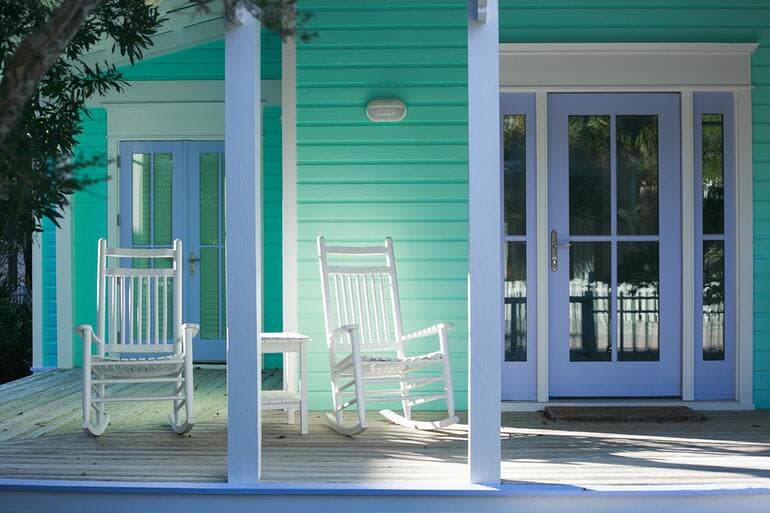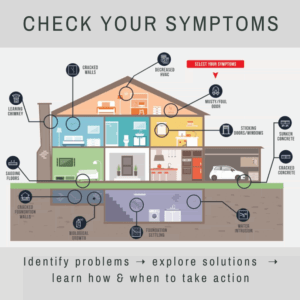
Originally published 10/31/18, updated 12/14/22
In a perfect world, the house you want to sell has no issues and was constructed correctly from the beginning. There is no wear and tear, and buyers are lined up at your door, fighting one another for the chance to pay you the asking price.
However, nature has different plans. There are many elements at work, trying to damage your home; wind, rain, snow, settling soil, burrowing animals, mold and insects all conspire together. You also may need to consider that your home wasn’t built using the technology and materials now available.
So what is a home seller supposed to do? Anticipate the potential issues a buyer will encounter, and address them. An experienced realtor can help you with this process (find one here). At Acculevel, we’ve been repairing homes for potential buyers & sellers since 1996, and can help you understand the long-term implications and benefits of foundation repair.
A stable foundation is of critical importance to your home. Everything else is built on top of it, so if there are problems in the foundation, there will eventually be problems in the house above it. The health and stability of your home is not a feature; it is a basic expected value. Buyers may be interested in your home theater room or koi pond, but only if they can assume the home is safe for habitation.
If the foundation has visible cracks, water seeping into the basement, or the stale odor of mold, your buyers may simply turn and walk away. None of these warning signs will appeal to someone who wants to move in immediately or who doesn’t want to finance repairs on top of a home mortgage. Realistically, there are very few buyers lining up to buy a house with critical issues like a weak foundation.
The banks that provide home mortgages will do more than a surface check for issues. They require a home inspection, performed by a licensed professional. A home inspector will scrutinize your house and property, thoroughly documenting all the flaws they find. If your foundation does not pass inspection, the bank may deny your buyer for the home loan, or make it contingent on repairs being made.
At that point, fixing the foundation becomes part of the negotiation process- or your buyer may just walk away. Either way, the foundation issues will cost you: in time, money or both.
Yes, you can. But your asking price will need to be significantly lower than it would be after repairs.
This is because a home needing major repairs appeals to two distinctive buyer types:
Neither of these buyers are willing to pay more than the minimum because they know from the start that they’re going to have to invest in repairs.
In most cases, it’s worth the investment to have the repairs done before you list the home. If you’re undecided, you can get quotes for the work from reputable contractors, then share this information with potential buyers. Then both parties can negotiate the home’s sale price, with allowances for the cost of repairs.
Foundation issues are estimated to reduce a home’s value by 10-15 percent.
We understand that you’d rather not spend money on the home you’re selling. It can be hard to accept that you need to put money into something as unglamorous as foundation repair. Sadly, in a few cases, we’ve even met homeowners who would rather cover up cracks with a coat of paint and try to sneak it past the inspection. Clearly, we do NOT recommend this as an option. Not just because it’s horribly unethical, but also because it will not get you ‘off the hook.’ If your buyer proves you were aware and concealed it, you will still be held liable.
Not sure what is wrong with your home?
Use Acculevel’s free tool to review your symptoms.
As much as I hate to say this, it depends on what you need done.
The more severe the damage, the more it will cost you.
Unless you use the basement as a home office or rent it out, you cannot claim foundation repair as a tax deduction. As a general rule, your home insurance won’t cover the repairs, either. You will need to absorb most, if not all, of the cost. But once the repairs are done, your home should regain most of its listing value, and you’ll be able to sell it with confidence.
Before signing any contracts, review the contractor’s warranty policies. We have researched the industry standards and learned that warranties on services are not regulated. If you can provide a warranty that is easily transferable, this could go a long way towards reassuring your potential buyers. You can find the full article here; as an additional resource, this article also provides a list of questions you should ask a contractor.
You may be tempted to rush this process, to reduce the energy you exert on the house you’re trying to leave behind. But I urge you to be thorough, and work with an experienced company that will provide a quality repair and warranty for their work.
Before you sign a contract for any service, always verify the company is reputable, insured, and accredited by the Better Business Bureau.
If you live in Indiana or the surrounding states, contact Acculevel. Our warranties are clearly defined, whether they are for a specific time period or are life-of-structure. All of our warranties are transferable without any additional charges, and none of them require that you meet additional conditions or pay for additional services.
We also offer free estimates. One of our experienced project advisors will evaluate your foundation and recommend the best course of action for you as both a homeowner and a potential home seller.
[DISPLAY_ULTIMATE_SOCIAL_ICONS]